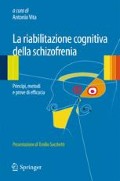Riassunto
Le difficoltà di trattamento dei deficit cognitivi hanno portato a un crescente interesse per gli approcci sperimentali basati sulla riabilitazione neurocognitiva dei deficit neuropsicologici evidenti nei pazienti affetti da schizofrenia. Basandosi sull’ipotesi che ridurre i deficit aumenterebbe il funzionamento globale (Wykes et al., 1999), negli ultimi anni diversi studi hanno investigato gli effetti di programmi di riabilitazione cognitiva standardizzati su un’ampia gamma di deficit neurocognitivi nella schizofrenia. I risultati concordano tutti nell’affermare che tali deficit possono essere modificati grazie all’impiego di tecniche riabilitative neurocognitive; le più recenti affiancano alla pratica ripetuta un supporto computerizzato.
Access this chapter
Tax calculation will be finalised at checkout
Purchases are for personal use only
Preview
Unable to display preview. Download preview PDF.
Bibliografia
Bell M, Bryson G, Greig T, Wexler BE (2001). Neurocognitive enhancement therapy with work therapy. Effects on neuropsychological performance. Archives of General Psychiatry 58:763–768
Bellucci DM, Glaberman K, Haslam N (2003). Computer-assisted cognitive rehabilitation reduces negative symptoms in the severely mentally ill. Schizophr Res 59:225–232
Benedict RHB, Harris AE, Markow T et al (1994). Effects of attention training on information-processing in schizophrenia. Schizophr Bull 20:537–546
Bracy O (1995). CogReHab Software. Psychological Software Services, Indianapolis
Cavallaro R, Anselmetti S, Poletti S, Bechi M et al (2009). Computer-aided neurocognitive remediation as an enhancing strategy for schizophrenia rehabilitation. Psychiatry Research 169: 191–1966.
Fisher M, Holland C, Merzenich MM et al (2009). Using neuroplasticity-based auditory training to improve verbal memory in schizophrenia. Am J Psychiatry 166:805–811
Cogpack ®, Version 5.1. Ladenburg, Germany, Marker Software. Available at: www.Cogpack.com/USA/frames.htm
Hogarty GE, Flesher S (1999). Developmental theory for a cognitive enhancement therapy of schizophrenia. Schizophrenia Bulletin 25:677–692
Klingberg S, Wolwer W, Engel C et al (2011). Negative symptoms of schizophrenia as primary target of cognitive behavioral therapy: Results of the randomized clinical TONES Study. Schizophr Bull 2(Suppl):S98–S110
Medalia A, Aluma M, Tryon W et al (1998). Effectivness of attention training in schizophrenia. Schizophrania Bulletin 24:147–152
Medalia A, Freilich B (2008). The Neuropsychological Educational Approach to Cognitive Remediation (NEAR) Model: Practice, principles and outcome studies. American Journal of Psychiatric Rehabilitation 11:123–143
McGurk SR, Mueser KT, Pascaris A (2005). Cognitive training and supported employment for persons with severe mental illness: one-year results from a randomized controlled trial. Schizophr Bull 31:898–909
Sandford JA, Browne RJ (1985). Captain’s log: Cognitive Training System (Version 1.3) [Computer program]. Psychological Software Services, Indianapolis
Schuhfried G (2003). RehaCom (Version 5) Basic Manual [Internet]. Hasomed, Magdegurg. Available at: http://www.hasomed.de/fileadmin/user_upload/Rehacom/Manuale/ENG/RehaComEN.pdf
Wikes T, Reeder C, Corner J et al (1999). The effects of neurocognitive remediation on executive processing in patients with schizophrenia. Schizophr Bull 25:291–307
Wykes T, Brammer M, Mellers J et al (2002). Effects on the brain of a psychological treatment: cognitive remediation therapy: functional magnetic resonance imaging in schizophrenia. Br J Psychiatry 181:144–152
Author information
Authors and Affiliations
Corresponding author
Editor information
Editors and Affiliations
Rights and permissions
Copyright information
© 2013 Springer-Verlag Italia
About this chapter
Cite this chapter
Fresi, F., Poletti, S., Cavallaro, R. (2013). Cogpack®: presupposti, descrizione e metodi a confronto. In: Vita, A. (eds) La riabilitazione cognitiva della schizofrenia. Springer, Milano. https://doi.org/10.1007/978-88-470-2802-9_12
Download citation
DOI: https://doi.org/10.1007/978-88-470-2802-9_12
Publisher Name: Springer, Milano
Print ISBN: 978-88-470-2801-2
Online ISBN: 978-88-470-2802-9
eBook Packages: MedicineMedicine (R0)

